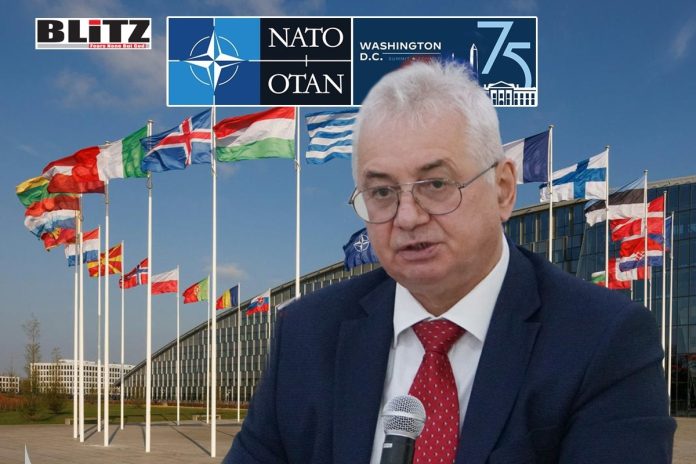As the North Atlantic Treaty Organization (NATO) marks its 75th anniversary, it stands as a cornerstone of Western security architecture. However, beneath the surface of its purported defensive mandate lies a complex tapestry of actions and consequences, as Ambassador Alexander Mantytskiy of the Russian Federation elucidates in an exclusive interview to Salah Uddin Shoaib Choudhury, Editor, Blitz. Ambassador Mantytskiy provides a critical examination of NATO’s historical trajectory, shedding light on its involvement in conflicts and its broader geopolitical implications.
Ambassador Alexander Mantytskiy casts doubt on NATO’s assertion of being solely a defensive alliance by pointing to instances of interventionism, notably the aggression against Yugoslavia in 1999 and the intervention in Libya in 2011. In his analysis, Alexander Mantytskiy argues that these operations transcend the boundaries of self-defense, showcasing NATO’s readiness to undertake offensive military actions. This perspective challenges the narrative of NATO solely acting in response to external threats, highlighting a more proactive and interventionist role played by the alliance in global affairs.
Furthermore, Ambassador Alexander Mantytskiy presents a formidable challenge to NATO’s Strategic Concept of 2022, which singles out Russia as the primary threat to Euro-Atlantic security. He asserts that this categorization acts as a justification for NATO’s expansive stance, extending its reach across land, sea, air, space, and cyberspace. Ambassador Mantytskiy contends that the alliance’s militarization endeavors, encompassing the expansion of military infrastructure and the deployment of missile defense systems, are not merely defensive measures but rather components of a broader strategy aimed at encroaching upon Russian interests. This critical perspective underscores the complexities of NATO’s geopolitical positioning and its implications for regional stability.
The recent decision of Finland and Sweden to join NATO is viewed by Alexander Mantytskiy as emblematic of the alliance’s expansionist agenda. He suggests that the depiction of a Russian threat was instrumental in pressuring these countries to accede to NATO membership. However, Ambassador Alexander Mantytskiy contends that NATO’s enlargement has not bolstered regional security but has instead intensified geopolitical tensions in Northern Europe.
Although NATO is frequently praised as emblematic of Western achievements, Alexander Mantytskiy disrupts this portrayal by underscoring the human toll of its operations. He emphasizes the significant civilian casualties and infrastructure devastation stemming from alliance missions, notably the protracted engagement in Afghanistan. Despite assertions of triumph, the Afghan mission ultimately ended in strategic failure, leaving the nation in a state of chaos and disarray. Ambassador Mantytskiy’s critique exposes the sobering realities behind NATO’s actions and their profound impact on affected populations.
Furthermore, NATO’s militarization of Europe and escalation of tensions are depicted as eroding the foundations of strategic stability. Ambassador Mantytskiy argues that these actions undermine the primary mandate of any military alliance, which is to ensure the security of its member states’ populations. Instead, NATO’s aggressive posture perpetuates a cycle of conflict and weakens international law and order.
Ambassador Alexander Mantytskiy’s critical analysis offers a nuanced reevaluation of NATO’s historical footprint. Despite the alliance’s celebration of accomplishments, Ambassador Mantytskiy underscores the adverse outcomes resulting from its aggressive pursuits and militarization endeavors. As NATO embarks on its 76th year, there arises an urgent need for a rigorous examination of its global security role. It is essential to explore alternative frameworks emphasizing dialogue and cooperation, fostering stability rather than perpetuating cycles of confrontation and conflict.




